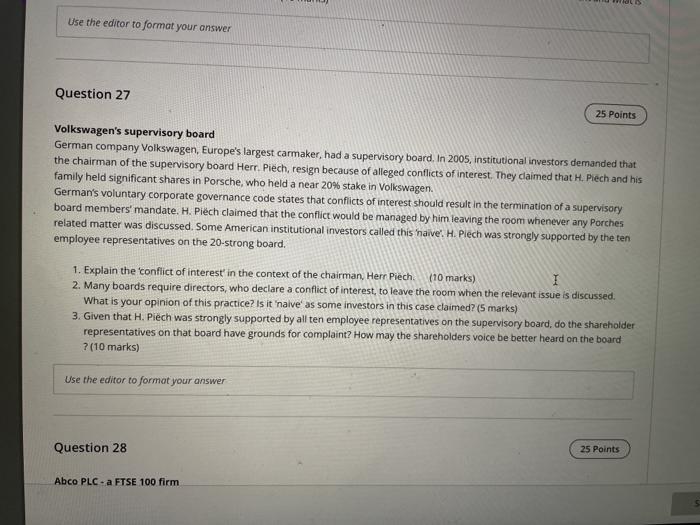Use the editor to format your answer Question 27 25 Points Volkswagen's supervisory board German company Volkswagen, Europe's largest carmaker, had a supervisory board. In 2005, institutional investors demanded that the chairman of the supervisory board Herr. Piech, resign because of alleged conflicts of interest. They claimed that H. Piech and his family held significant shares in Porsche, who held a near 20% stake in Volkswagen. German's voluntary corporate governance code states that conflicts of interest should result in the termination of a supervisory board members' mandate. H. Piech claimed that the conflict would be managed by him leaving the room whenever any Porches related matter was discussed. Some American institutional investors called this naive. H. Plech was strongly supported by the ten employee representatives on the 20-strong board. 1. Explain the conflict of interest in the context of the chairman, Herr Piech. (10 marks) 1 2. Many boards require directors, who declare a conflict of interest, to leave the room when the relevant issue is discussed. What is your opinion of this practice? Is it naive as some investors in this case claimed? (5 marks) 3. Given that H. Plech was strongly supported by all ten employee representatives on the supervisory board, do the shareholder representatives on that board have grounds for complaint? How may the shareholders voice be better heard on the board ? (10 marks) Use the editor to format your answer Question 28 25 Points Abco PLC - a FTSE 100 firm Use the editor to format your answer Question 27 25 Points Volkswagen's supervisory board German company Volkswagen, Europe's largest carmaker, had a supervisory board. In 2005, institutional investors demanded that the chairman of the supervisory board Herr. Piech, resign because of alleged conflicts of interest. They claimed that H. Piech and his family held significant shares in Porsche, who held a near 20% stake in Volkswagen. German's voluntary corporate governance code states that conflicts of interest should result in the termination of a supervisory board members' mandate. H. Piech claimed that the conflict would be managed by him leaving the room whenever any Porches related matter was discussed. Some American institutional investors called this naive. H. Plech was strongly supported by the ten employee representatives on the 20-strong board. 1. Explain the conflict of interest in the context of the chairman, Herr Piech. (10 marks) 1 2. Many boards require directors, who declare a conflict of interest, to leave the room when the relevant issue is discussed. What is your opinion of this practice? Is it naive as some investors in this case claimed? (5 marks) 3. Given that H. Plech was strongly supported by all ten employee representatives on the supervisory board, do the shareholder representatives on that board have grounds for complaint? How may the shareholders voice be better heard on the board ? (10 marks) Use the editor to format your answer Question 28 25 Points Abco PLC - a FTSE 100 firm







